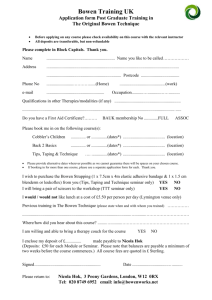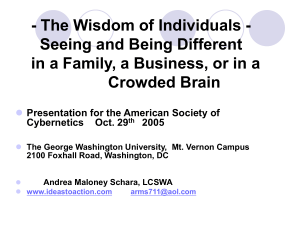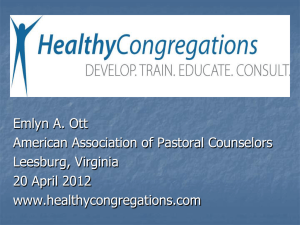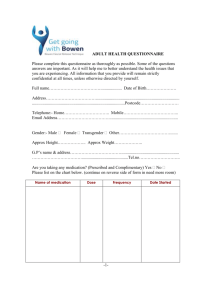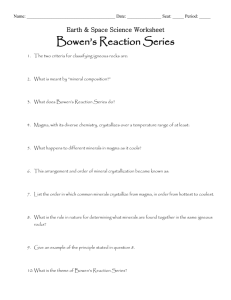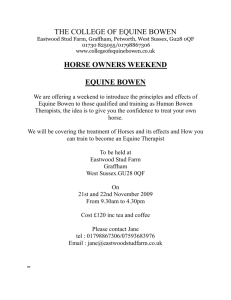Family Systems Theory LP5
advertisement
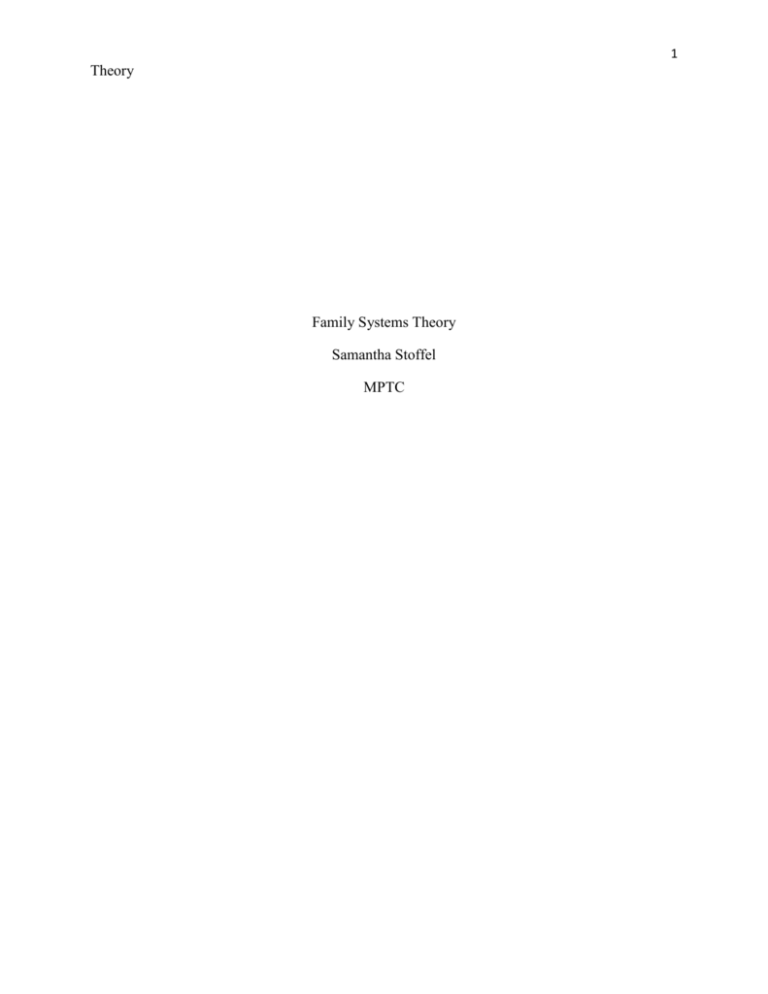
1 Theory Family Systems Theory Samantha Stoffel MPTC 2 Theory I chose to write on the Bowenian theory of addiction counseling. I found this theory to be a bit more interesting than the others. Murray Bowen was an evolutionist who founded and developed what is called the “family systems” theory. Murray dates back to the second Civil War and after the war he trained and worked at the Menninger Clinic in Topeka, Kansas. As he resided there he became more aware of his own family of origin and discovered that many patients tended to complain about the way the family members interacted. He believed people are a result of an evolutionary process and all processes are common in nature. Therefore, the way an individual receives and processes information will directly result in the way that individual behaves. The belief is we function within our family in a cognitive/emotional state. These two states are interdependent and therefore develop patterns in cognitive and emotional functioning. These are both entities within all of us as well as learned responses to the issues around us. Bowen also believed in multigenerational transmission. He felt focusing on a multigenerational plane would best give reasons to the issues one is dealing with in the present. This means that until issues within the family as a whole are dealt with successfully, the same issues will continue to effect generations to come. This will only cause a downward spiral within the family and change will cease to exist. Therapy is geared towards both the individual and couples who have an effect on the family and therefore works from the inside out (“Bowenian Family Systems Theory and Therapy”, 2014). Bowen is a believer of self-differentiation. Self-differentiation is the ability to separate one’s intellectual and emotional functioning while at the same time having the ability to separate you from the issues of others. Individuals within a family are greatly influenced by the family’s emotional atmosphere. One’s beliefs, values, attitudes and feelings can all be influenced by this. 3 Theory In most cases, the parents, or the individuals who make the rules are the ones who create the atmosphere within the family. In a family who is chemically dependent, the locus of control usually lies with the most dysfunctional person. The most dysfunctional person does not necessarily mean the one who has the addiction. Each person within a family perceives the family atmosphere differently. Bowen also talks about “emotional maturity” and is referred to as the “level of differentiation.” People usually follow their parents or grandparents when speaking of emotional maturity. People look to their elders for a sense of belonging, security, and how they react to what is happening around them. Many children often follow on how their parents react about issues and the way they view not only issues, but outside individuals as well. People look to their elders for wisdom and guidance. For many, this is all they know and what is considered to be dysfunctional to others is considered functional or normal to them. It seems very abnormal and twisted, but this is very real. I have seen it many times and have happened directly to me on many occasions with my family as a child and as an adult. According to Bowen, the level of functioning depends on four factors; basic level of emotional maturity, level of stress, patterns of symptomatic reaction peculiar to the family or particular to a family member and the level of adult-to-adult contact with members of the extended family (Curtis, Chemical Dependency: A Family Affair, 1999, pp 35). In a family there is usually a person who acts underresponsible and one who acts overresponsible. This depends on the family’s emotional maturity. The overresponsible person usually feels responsible for everyone in the household, including feelings, acts, and emotions. They feel they need to pick up the slack leftover from the other family members. The person taking on this role feels they need to control what is going on and tries to do “what’s best” for the family. Manipulation tactics and enabling become useful tools in the event of trying to cover up the truth and the family will 4 Theory appear “normal” to outsiders looking in. The underresponsible person tends to give too much of themselves and become more and more dependent on the overreponsible one. This person also loses confidence in them. Neither of these roles is healthy. This is where counseling comes in. The goals of this therapy are; reframing the problem as multigenerational, lowering anxiety, increasing differentiation, opening closed ties with cutoff family members, focusing on the overall problem, and evaluating the progress of the family (“Bowenian Family Therapy”). The role of the counselor is to help the client see and accept they have a problem and go from there. It is the role of the counselor to trace the family pattern and pay attention to the patterns of emotional reactivity. Some of the advantages of this therapy are that it offers a multiview of a family over generations. The therapist is able to apply their life in one way or another to the therapy process (“Family Therapy, 2011”). Some disadvantages I found were that this therapy has sometimes devoted to much time to the mother’s contribution to the family and not enough on the father. All in all, I find this therapy useful for clients facing addiction. I find it intriguing that this therapy focuses a lot on the previous generations. I do not know much about my previous generations to give much of an analysis. I also enjoy that it focuses on the role of the family members and deals with issues individually and together. Anxiety is something everyone faces at one point or another during their lives, addressing it and dealing with it is key. I know I could use some help with my anxiety issues. My anxiety affects everyone in my family and it is hard to control. I am working on it. 5 Theory References Bowenian Family Therapy. (n.d.). Retrieved November 12, 2014, from http://www.psychpage.com/learning/library/counseling/bowen.html Bowenian Family Systems Theory and Therapy. (2014, January 1). Retrieved November 7, 2014, from http://www.theravive.com/research/Bowenian-Family-Systems-Theory-and-Therapy Curtis, O. (1999). Family Therapeutic Theories. In Chemical Dependency: A Family Affair (pp. 25-26). Pacific Grove: Brooks/Cole. Family Therapy. (2010, January 1). Retrieved November 14, 2014, from http://www.ukessays.com/essays/psychology/family-therapy.php ("Bowenian Family Systems Theory and Therapy", 2014) 6 Theory (Curtis, Chemical Dependency: A Family Affair, 1999, pp. 25-26)
